-
Home
-
Shop
New -
Explore
-
Support
-
Track Order
Feb 27, 2023
Author:Lisa Martinez
If your cat has put on extra weight, it is important to take steps to help them get back into shape. Overweight cats are at a higher risk of developing severe health conditions such as diabetes, liver disease and joint problems.
You can help your cat reach their target weight safely and healthily with proper care and nutrition. In this article, we'll let you know some effective tips on how to help a cat lose weight.
The first step in helping your cat lose weight is to recognize if they are overweight. You can consult with your veterinarian for a professional opinion, or you can check yourself.
Since cats come in all shapes and sizes, it may be hard to tell if your kitty carries too much weight. Feel along their sides and spine. They are likely an ideal weight if you can quickly feel their ribs. If the ribs are difficult to find, your cat may be overweight.
Here are some ways to determine if your cat is putting on some extra pounds.
1. Visual inspection:
One of the most obvious signs of weight gain in cats is a change in appearance. If your cat's belly seems to be getting bigger or its ribcage is no longer visible, it may have gained weight.
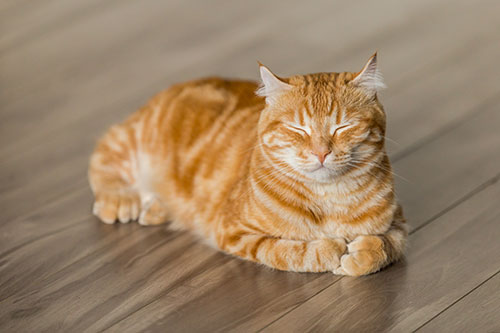
2. Use a scale:
Weighing your cat regularly is a good way to monitor their weight. You can use a regular bathroom scale and simply weigh yourself with your cat in your arms and then weigh yourself again without your cat to determine its weight. Make sure to use the same scale each time to get an accurate measurement.
3. Check the collar:
Another way to tell if your cat has gained weight is to check their collar. If the collar is starting to feel tight or leaves marks on the neck, it may be time to adjust the collar or invest in a larger one.
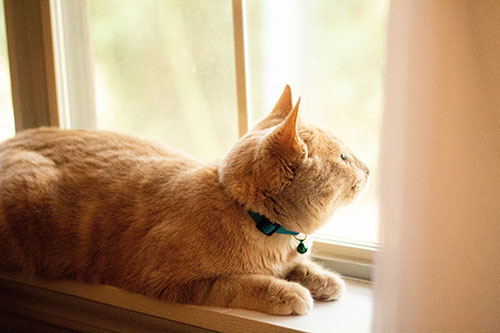
4. Visual Assessment:
You can also assess your cat at home to check for signs of obesity. Check if their waist is visible from above, or feel the ribs to check if they’re covered by too much fat.
5. Obesity Test:
A vet can determine whether or not your cat is overweight by measuring their body condition score (BCS). It looks at the cat’s height, weight and shape. The BCS goes from 1-9, with 1 being severely underweight, 5 being ideal weight, and 9 being severely overweight.
6. Measuring Food:
Pay attention to how much food you are giving your cat. Measure out their meals and monitor the amount of food they eat over time. This will help you gauge if they need more nutrition.
Overall, it is important to keep an eye on your cat's weight to ensure they are at a healthy size. By monitoring their weight and making necessary changes to their diet and exercise routine, you can help keep your feline friend happy and healthy.
You can help your cat lose weight by ensuring their diet is balanced, promoting exercise and monitoring their progress. You can combine diet changes, increased activity and regular weigh-ins. With these strategies in place, your cat should be able to reach its ideal weight safely.
When it comes to helping your cat lose weight, choosing the right cat food can make a big difference. Here are some tips for selecting a weight-loss-friendly cat food:
1)Look for high protein content: Cats are obligate carnivores, requiring a diet high in animal protein to thrive. Look for cat food that lists a high-quality protein source, such as chicken or fish, as the first ingredient.
2)Choose a low-carb option: Many commercial cat foods are high in carbohydrates, which can contribute to weight gain. Look for a portion of cat food that has a lower carbohydrate content and is made with fewer fillers and additives.
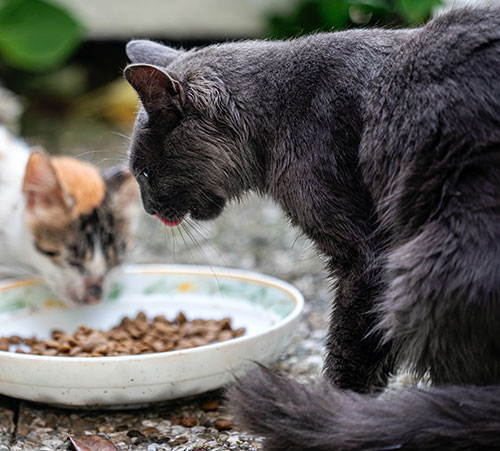
3)Consider a wet food: Wet cat food is generally higher in protein and moisture content than dry food, which can be helpful for weight loss. It can also be more satisfying for your cat, which may help them feel full on a smaller portion.
Remember, it's essential to make changes gradually when it comes to helping your cat lose weight. Sudden changes in diet can cause digestive upset and may not be well-tolerated. Work with your veterinarian to come up with a weight loss plan that is safe and effective for your cat.
Here are some more ways to help your fat cat lose weight.
Another key strategy to help your cat lose weight is to get them moving. This can be done through interactive playtime with toys or by taking a walk outside (if they’re comfortable wearing a harness and leash).
You can use automatic feeders to dispense your cat with the right food. This helps prevent overfeeding and ensures they get all the necessary nutrients while avoiding excess calories. Automatic feeders can be programmed to give your cat specific portions at specific times throughout the day, so you don’t have to measure out food each time manually.
Additionally, you can use an automatic feeder with an attached scale to monitor your cat’s weight over time and ensure that they are losing weight at a healthy rate. With these strategies in place, you can help your cat reach their ideal weight safely and effectively.

Our Recommendation
Plus, it has night vision camera capabilities and anti-jamming features, so there will be no clogs or blocks in their food path — ensuring they can lose weight safely while enjoying every meal!
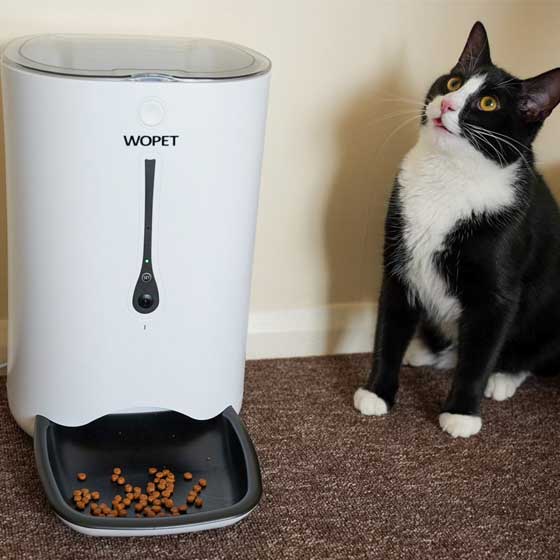
Treats are a great way to reward your cat. However, monitoring how many treats they get each day is essential. Too many treats can lead to weight gain, so make sure you only give them a few at a time and don’t let them overindulge.
You can also opt for healthier treats low in calories and packed with nutrients.
Make mealtime fun and engaging by introducing some interactive toys. This will help keep your cat active while they eat and can be a great way to encourage them to eat their food promptly. Interactive toys also provide mental stimulation, which can help reduce stress levels that may lead to overeating.
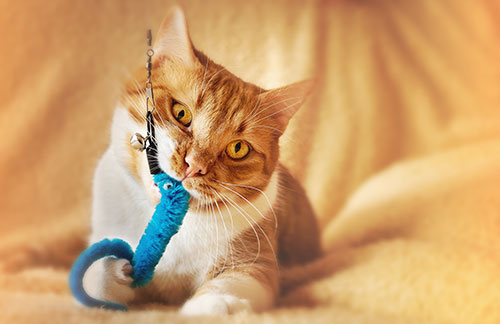
If you are still struggling to help your cat lose weight, it may be time to visit the veterinarian. They can check for any underlying medical conditions causing the weight gain and provide recommendations on how best to proceed. Additionally, they can offer advice on diet and exercise plans that would be appropriate for your cat’s health.
Check How Often Do You Take Your Cat to The Vet>>
If you want to help your cat lose weight, there are some essential things to keep in mind. Here are some helpful tips that can make the process of weight loss easier:
Smaller meals throughout the day can help prevent your cat from overfeeding. This will also provide them with a consistent energy supply, ensuring they stay healthy and active between mealtimes. Additionally, smaller meals can help stimulate their metabolism and ensure they get all the necessary nutrients without taking in too many calories.
Look for cat food specifically designed for weight management or weight loss. These foods are typically low in calories and packed with nutrition, helping your cat lose weight without sacrificing taste or quality. Additionally, these foods often contain added fiber to help promote digestion and keep them feeling full longer.
Regularly weighing your cat is essential to monitoring its progress and ensuring they lose weight at a healthy rate. You can weigh them yourself with a scale or visit the vet bi-monthly. This will help you track your cat’s progress and identify any potential health issues that may be causing their weight gain.
Playing with your cat is a great way to keep them active and burn extra calories. This can be anything from interactive toys like laser pointers or feather wands to brushing their fur or playing hide-and-seek around the house. Not only will this help them lose weight, but it will also give you some quality bonding time.
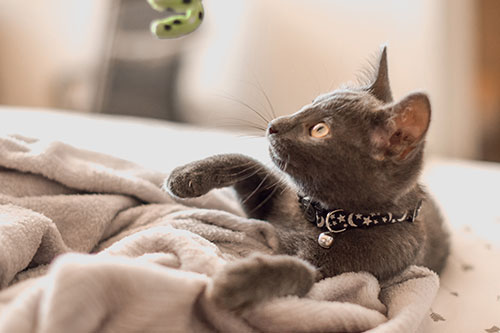
Weight loss takes time, so patience is essential and do not expect drastic results overnight. Setting realistic goals and tracking your cat's progress will help you stay motivated during the process. Additionally, providing lots of love and encouragement along the way can make a big difference in helping them reach their goal weight!
Helping your cat lose weight can be long and difficult, but you can see great results with the right changes to their diet, exercise routine, and lifestyle. Following these tips will help ensure that your cat is losing weight in a healthy manner and give them the best chance of achieving their goal weight.
Check your vet for additional advice about managing your cat’s diet and exercise routine. With a little bit of hard work, you’ll be able to keep your four-legged friend in tip-top shape!
Popular Post

Why Does My Cat Cough After Drinking Water? 8 Potential Reasons
Mar 13, 2023
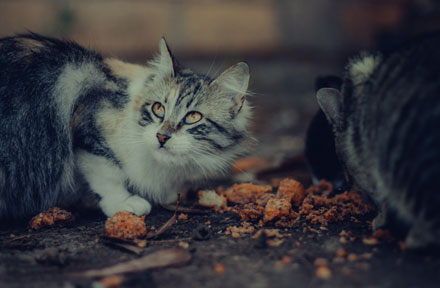
My Cat Only Eats A Little at A Time - What to Do?
Feb 27, 2023

What to Feed a Sick Dog With No Appetite? [2024 Guide]
May 16, 2023

Why Is My Dog Being Destructive All of A Sudden?
Feb 04, 2023
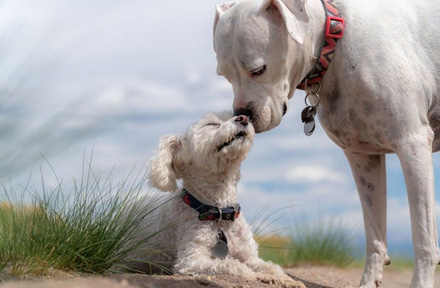
Do Puppies Miss Their Moms
Feb 11, 2023
Copyright © 2024 WOPET. All Rights Reserved.